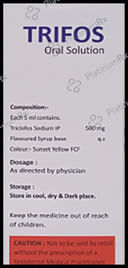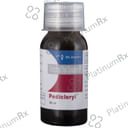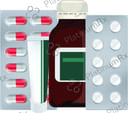Triclofos
Uses
Triclofos is used for the treatment of insomnia and as a sedative.
How it Works
How Triclofos works Triclofos is a hypnotic that is converted in the body into an active compound which acts on the brain to induce sleepiness. It reduces the time taken to fall asleep and increases sleep duration.
Side Effects
Common side effects of Triclofos include nausea, vomiting, drowsiness, and impaired coordination.
Expert Advice
- Administer Triclofos to your child only before bedtime.
- If you forget to give it at bedtime, do not administer it at any other time, as this may cause your child to feel drowsy, dizzy, and confused during the day.
- Triclofos may cause drowsiness as a side effect.
- Ensure your child avoids engaging in any mentally demanding activities soon after taking this medication.
- Inform your doctor if your child experiences stomach upset, vomiting, or abdominal pain while on this medication.
- Notify your child’s doctor if your child has any heart problems, as Triclofos may exacerbate these conditions.
- Never self-medicate your child, as using Triclofos without a doctor's prescription can be dangerous.
- Follow these self-care measures:
- Encourage your child to relax before bedtime.
- Maintain a log of your child’s sleep hours.
- Ensure your child eats nutritious meals at appropriate times.
- Avoid heavy meals close to bedtime.
- Check for noise and light in your child’s bedroom.
- Keep all screens (TV) and gadgets (mobile phones and others) away from your child before bedtime.
- Encourage your child to get ample natural light during the day, especially in the morning, as bright light suppresses melatonin, helping your child feel awake and alert during the day and sleepy at bedtime.
Related Medications
Triclofos

MRP ₹57
Triclofos 500mg

MRP ₹62.5
Triclofos 500mg

MRP ₹70
Triclofos 500mg

MRP ₹60
Triclofos 500mg

MRP ₹65
Triclofos 500mg

MRP ₹125
Triclofos 100mg

MRP ₹50
Triclofos 500mg

MRP ₹99.8
Triclofos 500mg

MRP ₹67.1
Triclofos 500mg

MRP ₹90
Triclofos 500mg

MRP ₹87.6
Triclofos 500mg

MRP ₹76
Triclofos 500mg

MRP ₹95
Triclofos 500mg

MRP ₹40.9
Triclofos 500mg

MRP ₹149
Triclofos 500mg

MRP ₹96
Triclofos 500mg

MRP ₹28
Triclofos 500mg

₹39.1
Triclofos 500mg

MRP ₹136.4
Triclofos 500mg

MRP ₹75
Triclofos 500mg

MRP ₹60
Triclofos 500mg

MRP ₹135
Triclofos 500mg

MRP ₹139
Triclofos 500mg

MRP ₹52.7
Triclofos 500mg

MRP ₹120.4
Flat ₹100 off on first app order | Use Code: APP100 |
Flat ₹100 off on first app order
USE CODE: APP100

Download Now